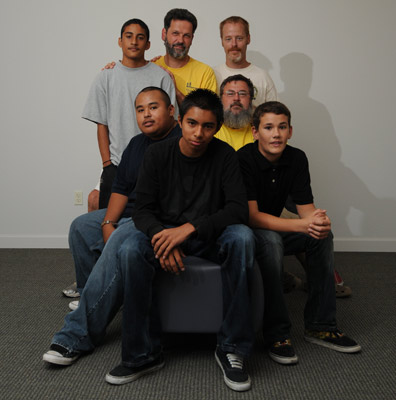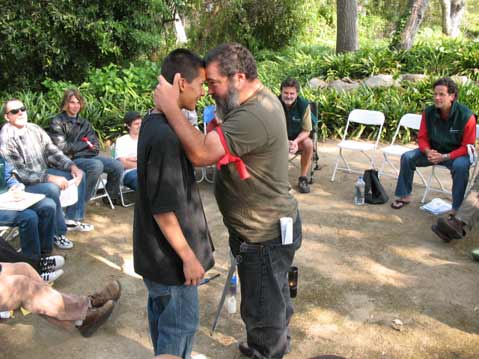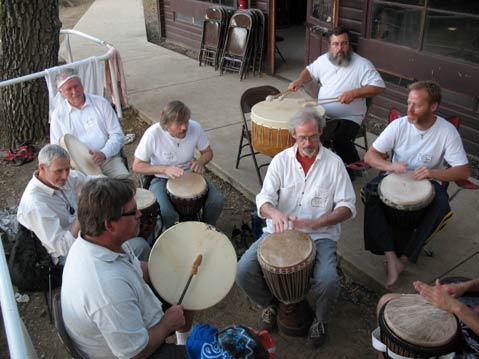Rediscovering the Rite of Passage
Boys to Men Helps Troubled Teens Reach Adulthood

“I figured I wasn’t going to make it to my 16th birthday,” the young man sitting next to me says. He squints into the sun, rubs a big hand over his close-shaved head. “I was in the Westside gang. I was known by a lot of people. I had my jaw broken in a fight when I was 14.” He speaks calmly, his deep voice lilting with the musical intonations of his native Spanish. “When I walked on the street, I always had to have something on me,” he says. “Half of Santa Barbara was after me: the whole Eastside.”
These days life looks a lot more hopeful for Dagoberto, or Dago as his friends call him. “Back then, people used to say my brother and I were the fuck-ups of the family,” he says. “Now they’re saying how much we’re changing.” He attributes the impetus for that change to his experiences with one organization: Boys to Men Central California Coast.
It was Dago’s older sister who found out about Boys to Men, a national mentoring network that accepts boys aged 12-17 and aims to guide them on their path to adulthood. One afternoon, she called her brother to let him know that a couple of men would be stopping by his house in a few hours to talk to him about the program. Dago had never heard of Boys to Men, and initially he wasn’t impressed. “It sounded weird,” he admitted, “but I wanted to learn new things.” Something made him decide to apply for the program’s initiation: a weekend-long camping trip that challenges participants physically, emotionally, and spiritually. “At first I was doing my old thing: trying to be the tough one, the racist one-trying to fight people,” he remembered. “In the middle of the weekend, I found out it changes people.”

The Definition of a Good Man
The details of these initiation weekends, known within the Boys to Men network as Rites of Passage Adventures, or ROPA, intentionally are kept secret, the idea being that their power would be diminished if participants knew what to expect. But the 2008 documentary film Journeyman gives a sense of the impact these weekends have on boys, as well as on the men who work with them. “I can see myself having a future now,” says one of the teenagers featured in the documentary. “Before, I didn’t.”
According to Stefan Hermann, founder and executive director of Boys to Men Central California Coast, men can provide this kind of revelation and empowerment only after they have opened up and explored their own issues. A former pro-tennis player from Germany, Hermann has been fascinated with self-awareness and personal development since the 1980s, but only became involved in the men’s movement seven years ago after realizing that he had no close male friends.
“My upbringing was about kicking someone else’s ass,” Hermann explained recently. “I was living this paradigm that if you open up yourself to men, you can get hurt really badly. I realized I was cutting half of the people on the planet out of my life, and that seemed very unacceptable to me.”
It was this realization that led Hermann to become involved in the ManKind Project (MKP), an educational organization that challenges men to lead lives of service and to develop their ability to communicate about their emotions. Through MKP, Hermann met the founders of Boys to Men, Craig McClain and Joe Sigurdson, who are based in San Diego.
In a recent telephone interview, McClain explained his motivation for starting Boys to Men. “I was a successful fashion photographer,” he said. “I’d go hang out with models all day. I made a lot of money. Then I attended a men’s weekend with the ManKind Project, which was about discovering who you are, learning to tell the truth, and becoming the man you were meant to become. I was 40 years old, and as I was driving away, I thought, ‘Man, I wish I’d done that when I was 16.'” When the San Diego chapter of MKP decided to launch a mentoring component of the organization, McClain volunteered right away. “I knew exactly what we needed to do,” he said. Boys to Men held its first weekend course in 1998.
“In large part, men today have abandoned their responsibilities to the next generation,” explained Sigurdson, whose vision for the organization was inspired by his father, Herb, a former leader of Boys Town. “These boys don’t have anyone showing or telling them how to be a good man. Our mission statement is: We help boys become better men. Our definition of a good man is that you give more than you take. If you ask these boys, ‘How many of you want to be good men?’ they all raise their hands. If you ask them, ‘How many of you are already good men?’ then one or two might raise their hands in a group of 20. We teach these guys how to be compassionate, responsible, caring men, and we do it by demonstrating it.”

Boy Scouts, Big Brothers, and Outward Bound Combined
Unlike mentoring programs that are based on one-on-one interactions between a young person and an adult, Boys to Men begins with a group initiation and then centers around regular group meetings, known simply as J-group. This is where “journeymen”-or boys who have completed an adventure weekend-come together to eat, talk, and get to know one another more deeply. One-on-one mentoring is only introduced once a boy has developed trust with the organization.
The combination of initiation, community building, and adult-to-teen mentoring is a potent one, and it’s gaining notice as more boys enter the program. To date, more than 3,000 boys have taken part in Boys to Men programs across the nation and abroad. Since it was launched three years ago, Boys to Men Central California Coast has worked with 80 young men from the region. With four adventure weekends planned for the coming year, approximately 80 more are expected to join.
Hermann said there’s never a shortage of boys interested in joining the program; the challenge is finding men who are willing to work with teens. Many adult men feel threatened by teenagers or concerned that they’ll be unable to relate to them, he said. Others have negative associations with their own teenage years, and resist having anything to do with boys at that age. But those who do step forward to serve as mentors say the experience is more rewarding than they could have imagined.
Mike Lopez has been volunteering as a mentor with Boys to Men for two years. Over coffee a few weeks ago, he talked about how he got involved. “I went through a weekend course called Inner Mentor Training,” he explained. “It’s a personal journey back to a man’s adolescence, and it’s usually an interesting mix of pain and excitement. It really reinforced for me that the style of mentoring Boys to Men uses is not what we generally understand mentoring to be. You don’t need to give advice from your own life experience. What’s important is that we listen to the boys, and accept them. We don’t come from a place where they need fixing. It’s about encouragement, admiration, and loving them for who they are.”
While Lopez spoke, 12-year-old Skylar sat on the other side of the table doodling on a pad of paper. It was hard to tell whether he was listening until I asked him how he got involved with Boys to Men. “Mike thought it would be good for me because I didn’t have a male influence in my life,” he said, looking me straight in the eye. “My dad lives in Montana. At times it can get kind of difficult between me and my mom; she doesn’t always get what I’m doing. It provides an outlet, someone to talk to. Especially when something’s hard in my life, I go to J-group and talk and it feels like something is being lifted off me.” Although he is five years younger than Dago, Skylar considers him one of his best friends. “Obviously, the older boys have different agendas and lives,” he said, “but in the group, age doesn’t matter because we’re united.”
Honor, Manhood, and Respect
On a Tuesday evening in May, about 60 adults gathered in a common room at a low-income housing unit in Santa Barbara. Mothers with small children took their seats facing a podium at the front of the room, while a circle of men formed around the edge of the space. This was the homecoming ceremony for a Rites of Passage Adventure, and is a ritual designed to acknowledge the journey of initiation the young men had made during the weekend, and to welcome them home. When the space was packed, 20 young men filed into the room and took their seats facing the group. Sage smudges were lit, and the boys stood for a welcoming ritual borrowed from the Native American tradition.
“Formal ritual is associated with religion, but we don’t do religion here,” one of the program’s adult leaders explained to the assembled group. “We do tend to the spiritual. We try to go deep.” He gave a short history of the organization and its goals, explaining, “Boys to Men was grown from a real need. Two hundred years ago, our culture forgot how to initiate young men and women into adulthood. We are trying to give these boys something we never had.” He quoted an African proverb: “If we do not initiate the boys, they will burn the village down.”
Then the boys were invited to speak. At first, they shifted their weight and stared at their shoes, apparently shy in front of the crowd. Then one teenager with a somber expression stood, and swept a shock of blond hair out of his eyes. “If there’s one thing I got out of this, it’s to be part of a community that I really trust,” he said, and his face broke into an open grin. “This program was really cool and fun,” another boy volunteered. “I hated the mosquitoes, but I really recommend it.” Shared another, “I got a few things out of this weekend: honor, manhood, and respect.”
Finally, the families of the boys were invited to speak. “I’m so proud of you,” said one mother to her son. “I notice a difference in you. It gives me faith in the future.”
“I want to honor your growing confidence,” said a man to his younger friend. “I am impressed by how you respect your elders. You’re a very brave young man.”
Reconnecting Boys to Men
Although he believes the work of Boys to Men is needed in Santa Barbara, Hermann sees it as a universal need. “Obviously there were events in Santa Barbara like gang stabbings,” he said. “But for me it was not so much one specific event; it was more that I saw that this work was needed on a cultural level. We need to get men reconnected with boys. This issue is so prevalent all over the world: Teenage boys are falling behind, feeling alienated. We see the same violence and dysfunctional behavior all over the globe.”
Hermann also acknowledges the need for similar work with girls, but feels that women need to be the ones to provide it. Just recently, the mothers of boys involved in Boys to Men launched Empowered Girl Alliance, a sister organization dedicated to working with young women. Hermann also noted that the work of Boys to Men is meant to impact women as well as men. “We feel we are preparing men to be good husbands, brothers, and boyfriends-to create strong, healthy relationships with the other gender,” he explained.
Since launching Boys to Men Central California Coast, Hermann has helped spread the work to Germany and Switzerland, as well as to the American Southwest. Last spring, Dago and another journeyman accompanied Hermann to Santa Fe, New Mexico, where they helped train a group of adult men as mentors, and then led the region’s first ROPA. “It was nice to see boys going through what we went through,” Dago said of his time in Santa Fe. “They were mostly involved in gangs. I related to what they were saying.”
For Dago, Boys to Men remains a place where he goes for support, but it has also become a place where he can develop as a leader. “It has been helping me to make different decisions from the ones I used to make,” he said. “It has taken me out of the gang mentality. When I go there, I try to see other people’s opinions. Mentors are calling to check in with me all the time. That’s part of what we want: for someone to check in, like, every day, and to invite us to be involved.”
As for the future, Dago is focused on taking care of his mother, who is having health problems, and finishing high school. But he also wants to give back to the organization that he says saved his life.
“I’m still involved,” said Dago. “I made a commitment that I’m going to become a mentor when I turn 18.”
4•1•1
The next Rites of Passage Adventure takes place September 4-6, 2009. To get involved, visit boystomenccc.org or email Stefan Hermann at stefan@boystomenccc.org. To learn more about the national Boys to Men mentoring network, visit boystomen.org.



